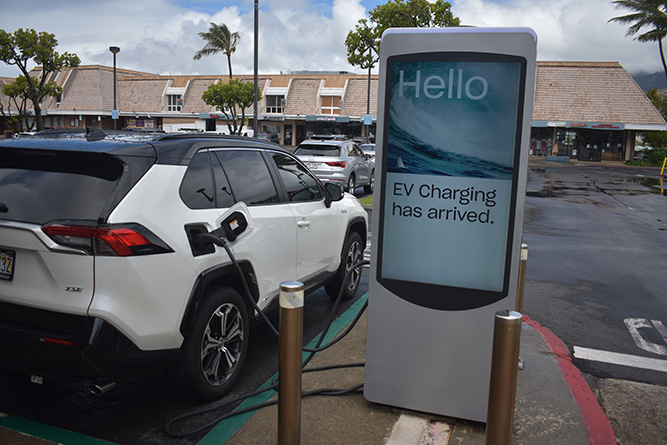Hawaiian Electric accepting applications for commercial EV charging stations pilot program

Hawaiian Electric is accepting applications for its new three-year Charge Up Commercial pilot program.
Under the $5 million program, Hawaiian Electric will pay for and install equipment — including transformers, conduit and electric panels — to support customer-purchased charging stations.
The goal of the program is to help establish up to 30 new electric vehicle charging sites on Maui, O‘ahu and the Big Island
The program can help customers significantly reduce the upfront cost of installing electric vehicle charging equipment at locations such as stores, businesses, condominiums, office buildings and fleet and parking facilities.
The infrastructure associated with EV charging typically represents a large investment that can be cost-prohibitive for some businesses. Charge Up Commercial helps bridge that gap by reducing the cost and complexity of installing charging equipment.
Charge Up Commercial application forms and additional information about the program are available on the Hawaiian Electric website.
“We’re excited to give businesses, condos and apartments the opportunity to meet current demand and get ahead of the curve by installing electric vehicle charging equipment,” said Aki Marceau, Hawaiian Electric’s director of electrification of transportation. “Not only is it good for business but installing charging stations sends a clear message that you support Hawai‘i’s ambitious clean energy goals.”
The pilot program approved by regulators authorizes Hawaiian Electric to provide “make-ready” infrastructure to support the installation of four to six Level 2 charging ports per site.
Hawaiian Electric will pay for and manage construction of infrastructure up to and beyond the customer’s meter to the point where the charging equipment is installed. Customer responsibilities include installing and maintaining the charging equipment.
Charge Up Commercial complements Hawaiian Electric’s new commercial EV charging rates that reduce the cost for commercial customers who provide EV charging services. The pilot program employs a time-of-use rate structure that incentivizes charging during midday hours when there is an abundance of solar energy on the grid.







